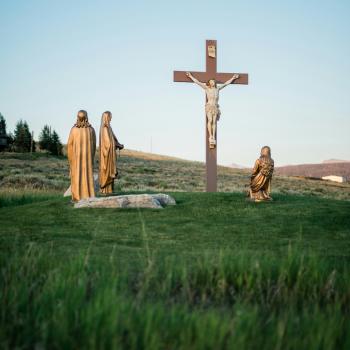Now, when readers see that the bulk of your book is an introduction to eight world religions, they may think: Ohhh, that sounds boring. That sounds a lot like other books I've got on my shelf already. In fact, you've got some surprisingly fresh sections in this book. Let's talk about what I think is the most important: your section on the Yoruba religion. There's very, very little good reading material out there. Wikipedia has a little bit on Yoruba religion, but that Wiki page is pretty lame. Your forty pages on Yoruba, which you subtitle "The Way of Connection," is one of the great selling points for this new book. I think people should buy it just for those forty pages.
I'm guessing that most of our readers aren't familiar with this religion. In fact, along with this interview I'm going to publish one of the online maps of dominant religions around the world -- and most of those maps don't even include the Yoruba religion. In your book, you give us a few popular culture connections with Yoruba. One comes from the 1950s, when Desi Arnaz used to sing songs naming the Yoruba "orisha," or manifestation of God, known as Babaluaye. Then, flash forward to 1990 when DC Comics began featuring Yoruba orishas in popular comic books to add more African diversity to DC's pantheon of superheroes. So, let's talk about this very unusual part of your book.
Thank you for noticing that! One issue when you're writing any general introduction to religion is the question of what you will include. At Boston University, I am the advisor for the Sikh student group and yet I didn't have enough space in this book to include Sikhism. I wanted to make room for the Yoruba religion because it's one example of religions that other writers tend to dismiss or to lump together with phrases like "primitive religions."
In planning this book, I asked the question: What are the leading religions of the world right now? I decided to write about the Yoruba tradition because it has close to 100 million adherents. And it has a real presence in the United States in groups like Santeria. It also has public power here, because one of the most important U.S. Supreme Court cases in the last century was the Santeria case in Dade County where there was an effort to outlaw the sacrifice of animals.
Okay, now you're referring to Santeria, which we might say is a New World branch from Yoruba, and readers will begin to light up with mental associations. But, we have to admit that some of those pop-culture associations are not good. I can think of stock villains in some mystery novels and movies that are cast as Santeria practitioners or followers of Vodou or Vodun.
Yes, we're aware of Vodou through pop culture. People have seen images and references to this tradition, so I thought that readers could use this opportunity to learn about this as a true world religion. I also had a very specific push in doing this. I gave a talk about two years ago in Louisville in an interfaith gathering and this African-American woman stood up and said: "I'm sick and tired of hearing about all these white religions all the time. When are you going to write about religions of people of color -- about African religions?"
Also, I have worked with Wande Abimbola, an important Nigerian scholar. This is a religion that is ancient and also is urban and has flourished in Nigeria and other parts of West Africa. It crossed the Atlantic with the slave trade to Central and North America and it's famous for merging in some ways with Catholicism to form movements over here.
I find it fascinating because of a few concepts in Yoruba religion. One is the concept of ashé, which can be translated as the power to make things happen. This power takes many forms in the world -- in people and in plants and animals, too. And a huge effort in the religion is to tap into ashé and create power for yourself. It's a tradition that put the notion of power front and center and also put the problem of disconnection and the goal of connection front and center.
A lot of us in the modern West feel disconnected from what matters in life, from sources of power. The more cell phones and computers and iPhones and iPads we have, the more we feel isolated at the same time. This is a religion that has thought for centuries about how to connect humans one to another and to the cosmos and to the gods and to the natural world -- and to connect us to our own true selves. The tradition is fascinating.
I'm sure we'll get an email or two from readers pointing out that Santeria and forms of Vodou aren't really the same thing as the original Yoruba religion, so let me at least ask you about your grouping of them.
If you get an email like that, then you've got very well-educated readers. But you're right. This is a real question, so I showed this chapter -- and all the chapters in my book -- to experts in these traditions. The one comment I got from some Yoruba experts is the thing we often hear in academia: Don't lump. Things are distinctive. And that is the bane of academics today. Buddhist scholars say there is no single Buddhism. There are many different Buddhisms. Others will say: Don't confuse Protestantism with Catholicism with Mormonism, because they're now three separate religions. But that isn't an issue of truth or falsehood. It's a question of what kind of zoom lens we place on our cameras as we explore these traditions.




